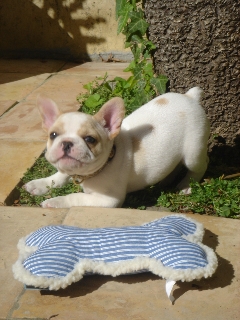First is Foremost

Why do so many of us have difficulty with change? Just the thought of change can produce stress and anxiety in the best of us. Think about the last time you changed your job, or your address. While it might have been exciting thinking about it, when the day arrives it is often difficult to cope with the changes it makes to our daily routine. Over time, the new routine becomes the norm until the next change. The act or an instance of making change can put many people in a tailspin.
Lets look at the same issues in our dogs. Thinking back to when they were pups, we can see that our efforts were concentrated on their small successes. We celebrated when they finally lay down when they were asked. In fact, we asked them to do it over and over again and each time we were thrilled. Our pups must have thought they had hit the pot of gold. Every time their bellies touched the floor, the praise and treats would appear in abundance. Of course, as trainers, we know that the more a behaviour is rewarded the more likely it is to occur and our pups were soon learning that lesson very well.
It was time to increase our pup’s education, and so we added new words. We rewarded our pups for sitting quietly, rolling over and coming when called. Time moved on and our pups grew up a bit, and with that comes adolescence and a tiny bit of testing behavior. Our pups were now questioning us, and we had to maintain our consistency in training. There was no longer a party of praise when our pup did his lessons. Sure, we gave him a treat and a pat, but the excitement that he had observed in the weeks gone by had slightly dulled. But our pups always remember what got them the most attention and the most praise. He remembers it was the lying down.
Trainers often refer to that as a default behavior. This term may have been adopted from the computer version. A computer default is a pre-selected option by a computer program when the user specifies no alternative. It can also mean a win when there is no opponent present.
What does that have to do with pups? It may be the option the pup chooses when he sees no alternative. Sure, we think the pup does have the option. He has the option to come when called or to sit when asked. Why would he lie down instead? It is an interesting observation, to see our dogs revert to what they knew best in times of stress. Are they stressed or just trying their best to please us? It might also mean we are not quick enough. If we say sit, and our pup sits and we don’t reward in a timely fashion, you might see your pup lie down instead. This is default behavior. When your pup doesn’t see the alternative, he will resort to what he knows best.
It might simply be a matter of reward. Remember that the more a behaviour is rewarded, the more likely it is to occur. So, when we initially start to train our pups, their knowledge of words is not extensive. They are rewarded a lot for the same action (lie down) because that is all they know. As our pups grow and learn more words, the rewards are then diluted over their entire repertoire. Add to that the fact that over time we tend to expect them to know more than they may actually know. If we say sit, and keep repeating ourselves, our frustration escalating, we may see our dogs lie down instead. We might then assume it is because they know a) this will please us, it has in the past and b) it will provide them with reward, it has in the past.
We need to fully understand that what they learn first, they learn best. Armed with this information, it is important for new puppy owners to get their pups into training classes as early as possible. While it is not high on the importance list to get your puppy to know all his words during the first few weeks after he arrives at your home, it is important to understand that this is a critical time to avoid bad habits. In fact, the over-training of a young pup might be too much for him to absorb, and cause its own issues.
What we need to do is make sure what he learns first is what he needs to know for the future. If he learns that he always gets scraps given to him from the table, that is the lesson that he will carry with him for a long time. Not to say it can’t be undone, but it is far easier to avoid it all together. If he learns that there are crumbs found under the baby’s high chair, he will gravitate to that spot consistently.
So…first things first. Make sure your pup is well socialized and well supervised when he is young. Make sure he understands the house rules from the beginning and make sure you are consistent with him in the first place. If you don’t want your dog up on the couch later, don’t allow him on the couch when he is a cute baby pup. If you want him to use a certain area of the yard as his toilet, take him to it when he is young. If you want him to understand that you will be consistent in his upbringing, don’t start repeating your words, or giving in to those puppy eyes when he is a youngster.
Change can be difficult for everyone, including our dogs, but not impossible. If you have trained your pup to sit in front of you for a cookie, it can be tougher to change his body position and now have him sit beside you when you are crossing the road. In fact, many times we speak to clients that have let their pup sleep on their bed and now that he is grown up, would like him to sleep on his own bed at night. Their excuse is that is it not fair for the dog to change the routine, or simply that he won’t be able to change. Change can always be made if you approach it with patience and consistence.
And, as we all know, change can be good. The change made will soon becomes the new normal. Reward for the newer actions, ignore anything else, and soon you will see the change and see the new behavior replace the old. Enjoy all the changes and the process of learning together and above all else, have fun training. Remember, when your pup gives you his default behaviour he is not necessarily being naughty, he is simply trying to make you happy.




